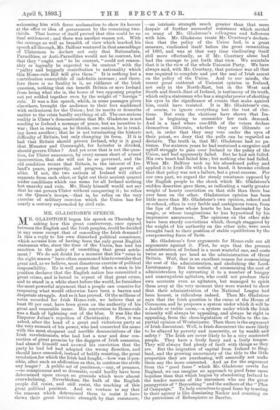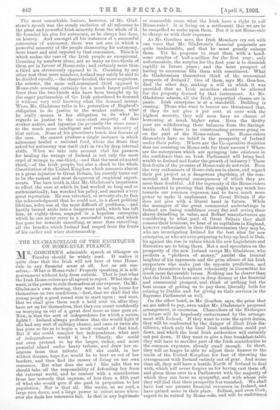MR. GLADSTONE'S SPEECH.
MR. GLADSTONE began his speech on Thursday by asking how this great controversy, once opened between the English and the Irish peoples, could be decided in any sense except that of conceding the Irish demand ? Is this a reply to his own disturbed political conscience, which accuses him of having been the only great English statesman who, since the time of the Union, has lent his sanction to the policy of unsettling that great settle- ment ? We do not doubt for a moment that his " reins in the night season " have often summoned himto con siderthat great and, as we believe, most disastrous exercise of political responsibility. He is well aware that when a man in his position declares that the English nation has committed a great crime, and is bound to repent of that great ()rime, and to stand in a white sheet before the world, he furnishes the most powerful argument that a people can conceive for reopening what would otherwise have been a barren and desperate struggle. And so it has proved. Of the millions of votes recorded for Irish Home-rule, we believe that at least 90 per cent. have been given on the authority of his great and venerable name. His conversion to Home-rule was a flash of lightning out of the blue. It was like the Emperor Julian's rejection of Christianity. How, it was asked, after the head of a great and victorious party at the very summit of his power, who had connected his name with the most eloquent and terrible denunciations of the Irish revolutionists, who had lost a near and dear con- nection of great promise by the daggers of Irish assassins, had abased himself and earowed his conviction that the party he had led had adopted the wrong direction, and should have conceded, instead of boldly resisting, the great revolution for which the Irish had fought,—how was it pos- sible, after such an abdication as this, to continue the strife any longer? A public act of penitence,—nay, of penance, —so conspicuous and so dramatic, could hardly have been determined upon except on grounds which were almost overwhelming. Nevertheless, the bulk of the English people did resist, and still resist, the teaching of this great political penitent, And we venture to say that the reasons which determined them to resist it have i shown their great intrinsic strength by that resistance, —an intrinsic strength much greater than that mere despair of further successful resistance which carried so many of Mr. Gladstone's colleagues and followers with him. Mr. Gladstone treats Mr. Courtney's declara- tion that the policy of the Union had, in a great measure, vindicated itself before the great recantation of 1885, and was at that very time vindicating itself still more effectually, as if Mr. Courtney alone had had the courage to put forth that view. We maintain that it is the view of the whole Unionist Party. We have always said, with Mr. Courtney, that patience was all that was required to complete and put the seal of Irish assent on the policy of the Union. And to our minds, the recent great outbreak of Unionist opinion in Ireland, not only in the North-East, but in the West and South and South-East of Ireland, is testimony of its truth, which onlya statesman who has a sin gularpower of shutting his eyes to the significance of events that make against him, could have resisted. It is Mr. Gladstone's cue, of course, to ignore everything but the test of elec- tions. But even the elections have shown that Ire- land is beginning to reconsider her rash demand. And in a ]and where one-fifth of the voters declare themselves illiterate, whether they are illiterate or not, in order that they may vote under the eyes of their priest, we deny that the polls can be regarded as decisive. The truth is, that Mr. Gladstone had no pa- tience. For sixteeen years he had sustained a sanguine and uphill struggle to gain over Ireland to the policy of the Union, and had apparently failed. But he had not failed. His own heart had failed him ; but nothing else had failed. When Mr. Balfour took up his abandoned policy and applied it to Irish ills with a firm hand, it became evident that that policy was not a failure, but a great success. For our own part, we regard the steady resistance opposed, by the English people to the shock which Mr. Gladstone's sudden desertion gave them, as indicating a vastly greater weight of hearty conviction on that side than there has ever been on the other. Gladstonian opinion has been little more than Mr. Gladstone's own opinion, echoed and re-echoed, often in very feeble and ambiguous tones, from the lips of those whose hearts he has fascinated by his magic, or whose imaginations he has hypnotised by his impressive assurances. The opinions on the other side have been sturdy convictions which, though staggered by the weight of his authority on the other side, were soon brought back to their position of stable equilibrium by the overpowering force of facts.
Mr. Gladstone's four arguments for Home-rule are all arguments against it. First, he says that the present administration of Ireland is a most wasteful one, and costs twice as much per head as the administration of Great Britain. Well, that is an excellent reason for economising the cost of the administration, and abolishing the Lord- Lieutenancy. But the notion of economising the cost of administration by entrusting it to a number of hungry and unscrupulous agitators, who could not produce their own accounts even as agitators, but managed to spirit them away at the very moment they were wanted to show that their administration of the National League had been honest, is ridiculous indeed. Then Mr. Gladstone says that the Irish question is the curse of the House of Commons, and he proposes a system under which it will be a double or treble curse,—a system under which the Irish minority will always be appealing, and always be right in appealing, from the class-legislation of Dublin to the im- partial opinion of Westminster. Then there is the argument of Irish discontent. Well, is Irish discontent the more likely to be allayed by poverty and insecurity, or by wealth and safety The Irish are never likely to be a very contented people. They have a lively fancy and a lively tongue. They will always find plenty of fault with things as they are. But the migration of capital from Ireland to Eng- land, and the growing uncertainty of the title to the little properties they are purchasing, will assuredly not make them any the more contented. And as for the argument from the " good fame " which Mr. Gladstone covets for England, we can imagine no approach to good fame more hopeless than that which begins by abandoning Ireland to the tender mercies of the statesmen who are the great panegyrists of " Boycotting " and the authors of the " Plan of Campaign." To help ourselves to good fame by trusting to their agency is like dismissing Necker and counting on the patriotism of Robespierre or Barrere. The most remarkable feature, however, of Mr. Glad- stone's speech was the steady exclusion of all reference to the great and powerful Irish minority from the whole of it. He founded his plea for autonomy, as he always has done, on history. And amongst all his instances of a successful concession of autonomy, there was not one in which a powerful minority of the people clamouring for autonomy,• were heart and soul opposed to that concession. This it is which makes the case of the Irish people so exceptional. Counting by numbers alone, not so many as two-thirds of them are in favour of Home-rule ; and certainly more than a third are strenuously opposed to it. Counting by any other test than mere numbers, Ireland may safely be said to be divided equally,—the clearer-headed, the more sagacious, the soberer, the more self-restrained third opposed to Home-rple counting certainly for a much larger political force than the two-thirds who have been brought up by the eager partisanship of the Irish priesthood to demand it without very well knowing, what the demand means. When Mr. Gladstone talks in his peroration of England's obligation to do justice to the weaker nation, what he really means is her obligation to do what he regards as justice to the numerical majority of that :weaker nation, and injustice (in precisely the same sense) to the much more intelligent and resolute minority of that nation. None of his precedents touch this feature of the case. He cannot produce a single instance in which autonomy healed a national feud, where the State that asked for autonomy was itself cleft in two by deep internal strife. When we take into account that his panacea for healing the wrongs of Ireland is not only the most cruel of wrongs to one-third,—and that the most educated third,—of the Irish people, but also a shock to the whole Constitution of the United Kingdom which amounts almost to a great injustice to Great Britain, his remedy turns out to be the rashest and most dangerous of empirical experi- ments. The bare truth is, that Mr. Gladstone's impatience to effect the cure at which he had worked so long and so enthusiastically, has wrecked his policy, and marred a very great reputation. He was reluctant, at seventy-six, to face the acknowledgment that he could not, in a short political lifetime, solve one of the most difficult of problems,—and hastily turned aside into a dangerous path, which has left him, at eighty-three, engaged in a hopeless enterprise which he can never carry to a successful issue, and which has gone far towards cancelling, or more than cancelling, all the benefits which Ireland had reaped from the fruits of his earlier and wiser statesmanship.



































 Previous page
Previous page